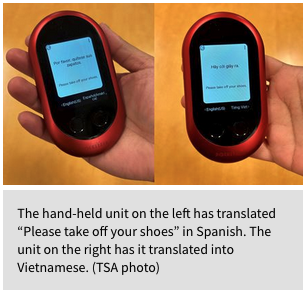If you don’t travel often, going through the TSA security checkpoint of an airport can be daunting. You may not know or remember everything you need to do, and having to follow all instructions “in the moment” can be an overwhelming experience.
To add insult to injury, imagine if you’re someone who doesn’t travel often, you get to the checkpoint and you don’t speak English? Or are you Deaf or hard of hearing? Or are a blind or have low vision? The directions the TSA officers are yelling at people are not super helpful, and even with signs, they’re not going to help if you don’t read the language, or only saw them when you got in the queue 25 minutes ago, or can’t read them because of your vision difficulties.
The TSA is piloting a program in Philadelphia that may help people in such situations. They’re currently testing new hand-held language translation-interpretation devices in an effort to support a more positive security checkpoint experience for individuals who are limited English proficient, international travelers and individuals who are deaf or hard of hearing or who are blind or have low vision.
The goal of this pilot program is to allow TSA to evaluate the viability of these devices by assessing the ease and effectiveness of their use and its impact on checkpoint operations.
“We hope that this will turn out to be a valuable tool for our officers to provide guidance to passengers who might not speak English,” explained Gerardo Spero, TSA’s Federal Security Director for Philadelphia International Airport. “For example, it will help us to explain in the language that the traveler understands, that we may need to open a carry-on bag for a search.”
 The device is small – about the size of an adult’s palm – and currently contains a library of 83 languages. A TSA officer or a traveler can speak into the device and it will translate the message into the language that’s selected. The device will audibly repeat the message into the chosen language for the traveler and it will appear on the screen for travelers to read if they are deaf or hard of hearing.
The device is small – about the size of an adult’s palm – and currently contains a library of 83 languages. A TSA officer or a traveler can speak into the device and it will translate the message into the language that’s selected. The device will audibly repeat the message into the chosen language for the traveler and it will appear on the screen for travelers to read if they are deaf or hard of hearing.
The devices can keep up to 10,000 translations that are “favorites” and commonly used. Software updates can be downloaded to add languages and words to the vocabulary library. Some foreign languages have specific dialects and other nuances. For example, the units distinguish four types of Spanish–that spoken in Spain, Argentina, Columbia or the United States (Note from Sharon…ooooh, if they plan to expand past Philly, they need Spanish spoken in Puerto Rico, too!).
From TSA:
“TSA has deployed five units to be used at checkpoints in Philadelphia’s international terminals A-East and A-West, and also at its busiest checkpoints in terminals B and DE. Since the rechargeable units work via Wi-Fi or data connection, they can easily be moved to any checkpoint lane where they are needed because they do not need to be tethered to an electrical outlet.”
The units have only been used for a short time but has already shown its benefits and challenges. TSA officials are seeing that they can’t use colloquialisms such as the term “pat-down,” since it doesn’t translate well into most other languages. They’ve also learned that, in a louds place such as a TSA security area, proper enunciation of words is required, otherwise terms like “your coat” translate into “you’re a coat.”
“The field testing of these units is one step that we are taking to improve our communication with a broader traveling population and further enhance the customer experience,” explained Jose Bonilla, TSA’s Executive Director of the agency’s Traveler Engagement Division. “The results of this field test will allow us to evaluate the viability of a small, stand-alone communication device at our checkpoints by assessing the ease and effectiveness of use and its impact on checkpoint operations.”
“This has potential to be a game-changer for travelers who are not fluent in English who come to our checkpoints,” Spero said. “It will ease their travel experience. Already we are seeing a positive impact.”
Want to comment on this post? Great! Read this first to help ensure it gets approved.
Want to sponsor a post, write something for Your Mileage May Vary, or put ads on our site? Click here for more info.
Like this post? Please share it! We have plenty more just like it and would love it if you decided to hang around and sign up to get emailed notifications of when we post.
Whether you’ve read our articles before or this is the first time you’re stopping by, we’re really glad you’re here and hope you come back to visit again!
This post first appeared on Your Mileage May Vary
